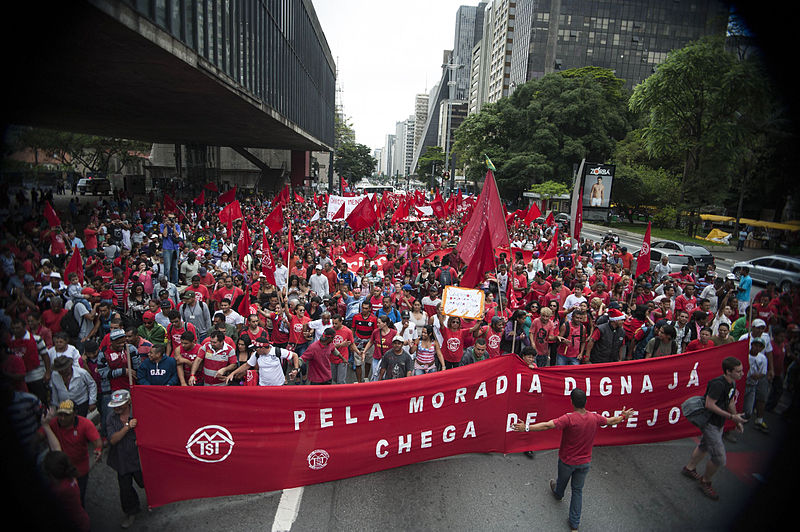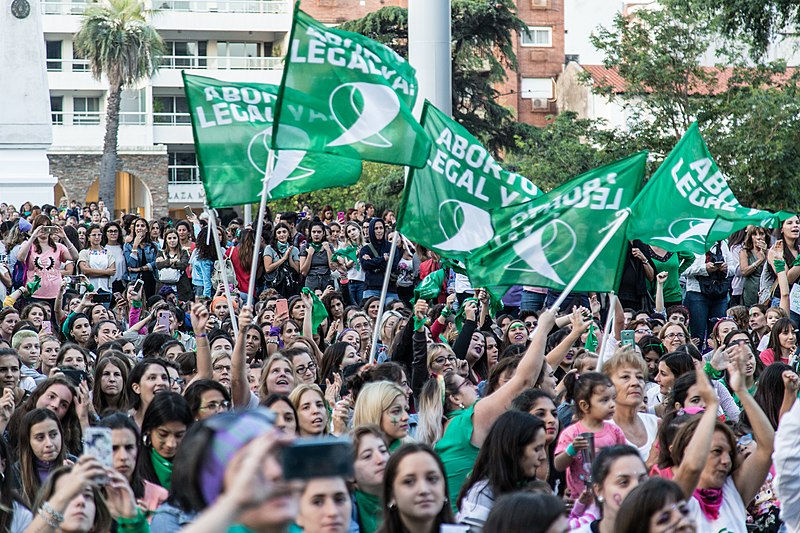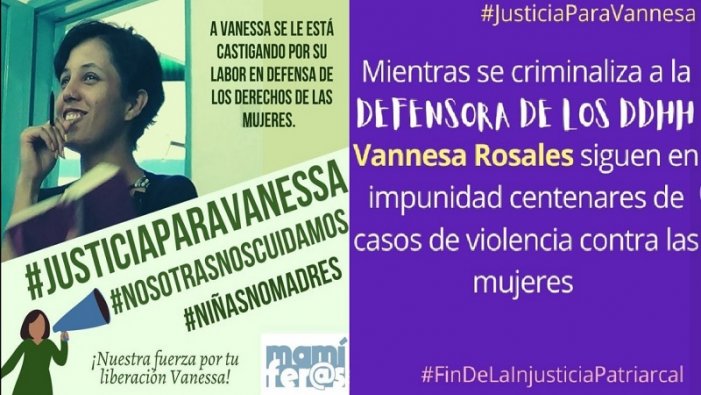There is a debate boiling over in the Democratic Socialists of America (DSA) about its international work. It comes on the heels of a delegation sent by the organization’s International Committee to represent DSA at the Congreso Bicentenario de los Pueblos in Caracas — a gathering of national and international supporters of the Venezuelan state, initiated by the government of Nicolás Maduro.
In Venezuela, the delegation attended conferences, visited selective communes, and met with President Maduro. Different opinions on whether socialism is alive and well in Venezuela, and what kind of solidarity should be extended to the people, and to the state of Venezuela, have ensued. This hot topic will be taken up at the upcoming DSA convention in August where several resolutions center around related questions.
The debate about erasing debates
This piece is put forward in the spirit of open debate and discussion in our multi-tendency organization.Thus far, the bulk of the DSA discussion about the Venezuela visit has taken place on social media, where epithets too often replace content. Nonetheless, disagreements can be healthy, and while we all agree that U.S. blockades, intervention, and economic bullying must be opposed without caveat, there are (and should be) multiple positions on international questions within DSA.
Declaring one side of this debate out of bounds based on ad hominem attacks of alleged CIA affiliation or alleged microsect positions is unhelpful. Worse, it spits in the face of popular struggles for democracy and against austerity, a defining phase of the Pink Tide in Latin America, even in countries whose leaders are self-proclaimed socialists.
It is healthy that activists in the DSA look to developments in Latin America as central to an international outlook. The organizations and movements in many countries in Latin America are much more developed than in our own. Titanic struggles in the 1990s gave way to new political parties and the experience of the Pink Tide. Neoliberal hegemony was rejected en masse, leading to a revitalization of ideas about alternatives to a capitalist economic model. Socialism as a political project has been discussed and debated widely.
At the same time, there were different phases of the struggle in Latin America that have produced contradictions between the parties that took power during the Pink Tide and the working class base they rely on. These different phases in turn produced different positions within the Latin American Left. So when divergences come up amongst those diverse Lefts, who should DSA extend support to? Who should DSA affiliate to? How should DSA understand the trends and dynamics and debates in the Latin American context? These questions should guide the conversation around our International work as activists based in the U.S. As socialists organizing in the heart of the empire, we have an obligation to listen to and pay attention to different voices on the ground in these countries. Other than our principled opposition to U.S. imperialism, we should not decisively take a position on these debates at the August convention.
DSA internationalism 2017-2021
In 2019, the DSA Convention took up the legitimate desire to solidarize with the popular struggles across the Americas through the passage of Resolution #4: Building the DSA International Committee. It was resolved that the DSA International Committee (IC) would “prioritize establishing relations with socialist and working class organizations in Mexico, Puerto Rico, Canada, Brazil, the Caribbean, and Latin America broadly, especially organizations with a genuinely mass character.” In contrast to “relations with socialist and working class organizations” (plural), at this year’s convention, the IC aims to narrow the precedent set in 2019 by resolving to: send election observer delegations to countries in the Americas; develop exchange programs with “mass parties” in other countries; continue to build relationships with “mass parties” in Latin America, develop dual membership with these parties and DSA; [and] apply for membership into the São Paulo Forum.

The 2019 DSA convention resolution was furthering the trajectory of rebirth and opening up of the organization that started two years prior. Thus, in 2017, DSA members transformed the organization’s historic approach to international work after the explosion of membership in 2016. The convention voted to end the long-standing affiliation with the Socialist International (SI), which had previously tied the group to a section of reformist and moribund political parties internationally. That proposal was passed in the spirit of opening up the organization to build more meaningful relationships and carry out international work in a new way. The resolution asserted a desire to grow and develop collaboration with organizations not tainted by ties to parties that adopted a neoliberal, austerity model that rejected anti-capitalist demands.
2021 feels different. There is a decline in participation and the moment has shifted since the hope of a Sanders’ campaign faded into the reality of a Biden administration future. In the absence of an honest discussion about the crossroads we face, the main organized forces in the organization seem to agree on the continued prioritization of an electoral orientation that sees winning electoral victories as the main marker of progress for socialists. The conversation about how much to continue developing independently as an organization around a more radical strategy is far less present than it was in 2019. It is in this context that Resolution #14 would move in the direction of tying us, at best, to left reform governments in Latin America.
In 2019, the convention set out to develop relations with “socialist and working class organizations.” It contemplated relations with a wide variety of groups and movements. The 2021 resolution much more clearly defines the priorities as being about building affiliations with existing states. This massively undercuts the broad array of forces that DSA set out to collaborate with and learn from since leaving the SI in 2017. Here are just a tiny number of examples, from just a few countries, of socialist and working class organizations that we should be talking to, and organizing with, and who are not “mass parties”: Campaña #LiberenALosTrabajadoresPresos (Venezuela); Campaña National por el Derecho al Aborto (Argentina); Coordinadora Feminista 8M (Chile); Frente de Izquierda y Trabajadores Unidad (Argentina); Lista del Pueblo (Chile); Marea Socialista (Venezuela); Movimento dos Trabalhadores Sem Teto (Brazil); Coordinadora Universitaria por la Justicia y la Democracia Nicaragua (Nicaragua); Partido Comunista de Venezuela/ Alternativa Popular Revolucionaira (Venezuela); Partido Socialismo y Libertad (Venezuela); Partido Socialismo e Liberdade (PSOL) (Brazil).
To be clear, I support the spirit of more international discussions and relationships, better education, and campaigns around trade and debt, anti-war, and anti-fascism as contemplated in the 2021 resolution. And while I am against the affiliation to the São Paulo Forum — really a symbolic gathering of self-described left parties that was formed in 1990 to take stock of the collapse of the Soviet Union but which gained further steam in 2002 after Lula’s first election in Brazil — such an affiliation won’t make or break DSA.
So why am I against the IC proposal? Because it carries with it an unstated assumption that we will support—without discussion and debate, i.e. uncritically— the ruling parties of various Latin American countries that are self-proclaimed socialists. And it thus rules out exploring and taking stock of an array of organizations and social movements, some of whom are in opposition to these parties.
Yes, we should send delegations to develop relationships and build solidarity with organizations and movements in the Americas. And I am sympathetic to the fact that the IC wants to make sure it is meeting with groups that truly represent people and have working class bases. However, the problem with the language of prioritizing relationships with “mass parties” is that it implies a foregrounding of relationships with parties that are, or have been, in power. It marginalizes and silences exactly those forces with which we share much in common and from whom we can also learn.

DSA should be meeting and collaborating with activists, organizers, and multiple different groups that are fighting for democracy and justice in the Americas – some of which may not fall under the rubric of a “mass party.” While this logic was used to justify the delegation to Venezuela that essentially took a state sponsored tour, the delegation ignored the recommendation of Venezuelans on the ground to also meet with left groups that are critical of the regime. What would have been lost by meeting with Maduro and making time to hear from opposition forces on the left? In practice, these comrades took sides, undermining the DSA’s ability to learn and better understand the dynamics as visitors who want to extend solidarity and build relationships internationally.
No uncritical support for ruling governments
One of the implicit arguments that is being raised in DSA is that because we are in the U.S. we must give uncritical support to regimes like Venezuela, Cuba and Nicaragua because U.S. imperialism is the biggest threat to people in those places. Others claim – wrongly – that no left opposition exists at all. Yes, U.S. imperialism must be taken on forcefully and without exception. But does this mean that we must uncritically stand with those states to the point of not entertaining support for dissent within those countries? Even when mass protests for bread and democracy break out in these places? Even when youth groups and socialists are being imprisoned for political activity? Even where women are denied access to abortion and criminalized for seeking control over their own bodies? What makes the “mass parties” worthy of uncritical support but not spontaneous mass outpouring of protesters? Do they really believe that anyone not carrying a “mass party card” is a right-wing plant?
There are diminishing returns on the logic of extending uncritical support for state regimes, and it sets us up to oppose working class and popular (landless, indigenous, feminist, student, peasant) mobilization when it happens in an inconvenient place or at an inconvenient time. While people can and do have different positions on what kind of support socialists extend to these parties and struggles, there is not a consensus on these debates in our own organization. So to preemptively narrow the DSA position to uncritical support for these states or “mass parties” would be a mistake that both disrespects the big-tent nature of the DSA, and more importantly, undermines and erases the nuance that exists in the Latin American Left around the experience of the Pink Tide.

Understanding the ebb of the Pink Tide
While the dynamics of revolutions (e.g. Cuba, Nicaragua) and U.S. backed dictatorships (e.g. Chile, Argentina, Brazil, Haiti, Honduras, etc.) was formative for previous generations of the Latin American Left, it is the ups and downs of the Pink Tide that have set the terms of debate over the last couple of decades.
The Pink Tide rose out of popular struggles against austerity and oppression: unemployed and workers movements during the Argentinazo after the economy collapsed in 2001; landless workers occupations in Brazil; indigenous rights and land struggles in Bolivia. From that starting point, it found an electoral expression, often defined by a developmentalist state policy that had structural limitations. In an effort to limit dependency of foreign capital, an extractivist economic model was adopted. These resource rich nations were able to generate revenue for social programs and to address poverty temporarily, but created new instability and left these governments vulnerable to the inevitable fluctuations in commodity prices on the global market.
The developmentalist model made it very hard to ever fully put an end to austerity governments. So policies which had previously been imposed internationally during the neoliberal years, were now being carried out by left-leaning parties. While the Pink Tide governments (ranging from Chávez’s Venezuela, Kirchner’s Argentina, Lula’s Brazil, and Morales’ Bolivia, among others) started with the intention of being able to develop a new economic model, they ended up adapting to the capitalist market in order to stay solvent, which in turn led to continued immiseration, oppression, and all too real domestic class struggle.
Often, this disconnect between the stated goals of the Pink Tide governments and the reality of what they delivered created new tensions between social movement bases that brought those governments to power, and the governments themselves. The social transformation that was promised was all too often not realized. These parties lost their social base of support, new rounds of protests emerged and the pendulum in elections swung right – it seems to now be swinging back to these parties. The ruling parties and states themselves are not the Left. They are part of the left, but do not speak for it. The process is ongoing and different forces have different positions on the tasks for socialists and how to understand these governments.
For a critical, humble, and solidaristic approach to international work
The debates in the Latin American Left about how to assess the Pink Tide experience are vibrant and have a material impact on the direction of those countries. Yet DSA members in the U.S. are being asked to take a position on those international debates, as an organization, at this convention. Despite accusations to the contrary, Resolutions 15, 16, and 17, attempted to grapple with these questions and democratize the IC to ensure that multiple perspectives are allowed to take part in DSA’s international work. It is a shame that these resolutions will not likely make it to the convention floor. Nonetheless, we should do our best to take stock of the debate.
Read the proposals for yourselves and decide what you think about them. In doing so, we can develop our own organization, to allow differences of opinion within our own IC, and affirm that we, socialists in the U.S., will approach our international work with respect, humility, and in solidarity with all of those who resist the horrors of life under capitalism.

